News
How safe is your cat?
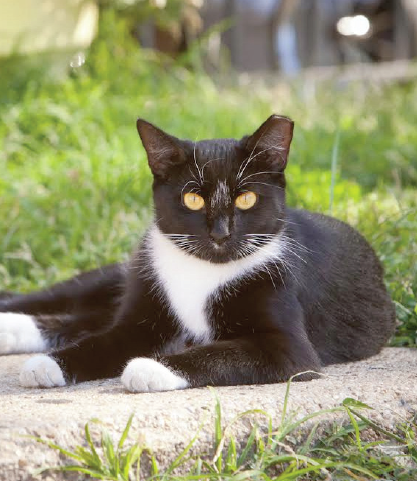

Missing ear: Peaches went for a wander and came back with a large portion of her ear cut off
A PEMBROKESHIRE woman’s cat was thought to have been caught by a feral hunter on Saturday (Apr 2) in a mistake that led to the cat losing an ear.
The Pembrokeshire vet who inspected Peaches the cat believes that the hunter must’ve thought that she was feral, shaving the left side of her body to see if she had been neutered.
When the hunter saw that she had been spayed, it is believed that she was then taken to the vets and, under anaesthesia, had her ear tipped.
The term ‘feral’ describes members of a domesticated species which have reverted back to living as wild animals, having little or no contact with humans.
It is very difficult for feral cats to be tamed, and this is not recommended because they could be very fearful of people, and this could seriously compromise their welfare.
There are currently approximately one million feral cats living in Britain, alongside the seven million domesticated cats. Strayed or abandoned pets, including pedigree cats, form part of the feral cat population, presenting an ongoing problem to British animal welfare societies.
FERAL CATS
Feral cats can live alone, or in colonies, and can be found everywhere, from towns and cities to more rural areas.
The best solution for feral cats is for them to be neutered and then returned to their familiar environment following the procedure.
The Neyland owner of Peaches the cat, said: “The top of her ear has been cleanly cut. Although she comes and goes as she pleases, usually when I call her it takes a maximum of two seconds to come back home. So, this procedure was done very locally in between the times of 2pm and 6.30pm when I was in Llanelli with my children.
“She is a very tame cat so it is clear to see that she was not a stray. It’s actually quite disturbing to be honest.
“Just be careful and keep an eye on your cats. They usually do these procedures near farms, but I live on a small cul-de-sac nowhere near a farm.”
Some people view feral cats as pests but others, particularly farmers, stable owners and smallholders, value feral cats for their role as working mousers that help protect grain and feed.
Despite their undomesticated nature, these cats can still benefit from a level of care which includes neutering. By neutering these cats, it can help to keep the colony size under control.
Feral cats that require going through the neutering process will usually be caught in a humane cattrap, as they are often too wild to be handled willingly. Following this, the cat is sedated so that a vet can give it a health check and treat it for parasites.
After the health check and neutering are complete, the cat is released back into its familiar territory as soon as possible. This is because the cat could possibly lose its communal scent, potentially leading to it being rejected by other cats in the colony if it is away for too long.
Cats Protection state that this procedure is usually completed in the evening and the traps are collected and inspected regularly to minimise stress to the captured feral cat.
They state that trapping and neutering a large feral colony could take weeks, with regular monitoring being needed to ensure that no cats are missed. Cats Protection aim to capture breeding females first to avoid growth in colony size whilst the neutering process is taking place.
Although catching and removing feral cats may temporarily reduce the numbers, this can lead to what is known as the ‘vacuum effect’, in which cats left behind will continue to breed and other feral cats will move into the area as it is evidently a good source of food and shelter.
NEUTERING
Experts have released that the solution to the feral cat problem is to trap, neuter and return the cats which, over the period of a few years, will aid in reducing the size of the colony whilst deterring other feral cats and keeping vermin levels at bay.
In addition to this, the RSPCA recommend that attempts should be made to find new homes for young kittens or other cats which are not totally feral as they deserve the chance to have their own caring owners.
The owner of the site where the feral colony resides also has to agree to the presence of the animals, which will aid in ensuring a stable existence for the colony. This will also help to make sure that there will be someone to monitor the health of the cats, as feral cats are more likely to get sick and injured than domestic cats.
The RSPCA believes that, after being neutered, each feral cat should have its left ear ‘tipped’, in which 0.5cm and 1cm of the ear will be removed to allow for easier future identification of neutered animals.
Vet Dr Patty Khuly spoke of the benefits of ear tipping: “It helps feline colony workers gauge the success of their efforts and help animal control officers know which colonies of cats are wellmanaged and stable.
“It’s useful and, relative to a dog’s ear crop, it’s absolutely painless when performed under anaesthesia. Cats recover without pawing at their ears or showing any other sign of distress.”
However, the owner of Peaches noted that it was the cat’s right ear that was cut, and not its left ear, and considerably more than 1cm was removed.
The sister of Peaches’ owner, said: “I’m sure in Tenby there was a woman a few years back thinking she was helping by taking matters into her own hands, neutering cats herself and cutting their ears off. Maybe there is someone similar to her about.”
A spokesperson for the RSPCA told The Herald: “We would be concerned to hear that a cat has been injured, and ask anyone with any concerns about animal welfare to contact us. We would welcome any information which might help track down what happened to Peaches as at the moment it is difficult to say for sure what has caused this injury.”
NOT JUST A UK PROBLEM
In other parts of the world, feral colonies are dealt with in a number of ways which are not quite so humane as ear-tipping and neutering. In Greece, Tunisia and Turkey, undomesticated cats are poisoned with Strychnine and in parts of Australia, the animals are killed with cat-specific toxins or feline pathogens such as cat flu or enteritis.
Some UK land-owners have been known to take the law into their own hands, using illegal leghold traps, crossbows, poisons or snares to deal with the cats. These traps have been recorded to kill domestic pets and other wildlife alongside the feral cats.
In 2000, a British man added fuelled cat-owners’ nightmares when he was convicted of killing neighbours’ pet cats using sardines and pilchards laced with cyanide. He did this over several years, killing numerous pets in the process before eventually being caught with enough poison to kill hundreds more.
Eluned Kronacher-Edwards said on social media: “Ear-tipping isn’t cruelty, it is trying to keep the feral population under control. The charities trap cats and if they aren’t neutered, they do so and don’t cut their ears off at all. They just nick the top so they know that they cat had been ‘done’, which would be like us getting our ears pierced.
“I can understand you would be upset if your domestic cat had been accidentally trapped but I hope this explains why. These are people who are rescue workers, not abusers. The cut shouldn’t be a deep enough cut to get infected. This is being done to prevent a raging feral cat population where the animals can get sick or starve.”
Jayne Roach, from Solva, also noted that her cat had recently come home cleanly shaved on one side, which she said was strange as her cat was still bald on the other side from being neutered.
Jayne’s cat, Reggie, is microchipped but was not wearing a collar at the time she was shaved, which she notes is because she “lives in the back of beyond so Reggie would just get it caught.”
SOCIAL MEDIA
A lot of pet owners have taken to social media to say a similar thing to Jane – that their cats often slip their collars, or don’t own one in the first place in case it gets caught, but think that their cats will be safe as they are microchipped and well looked after.
Lindsay Davies, Veterinary Nurse at All Pets Vet Care, said: “I personally haven’t seen domestic cats get confused with feral cats. But, I don’t think it’s easy to tell the difference at all. Unless the cat is microchipped then anyone can pick up a cat off the street, bring it in, claim it’s theirs and get it neutered.
“The only way to prevent that would be compulsory microchipping for cats as well as dogs, but unfortunately it’s unrealistic to regulate that as there are too many feral cats, so it’s a case of educating cat owners on the importance of microchipping their pets.
Ms Davies continued, stating that in the case of Peaches, vets all around Wales need to be pushed to scan the pets that are being brought in to prevent unnecessary eartipping and unwanted neutering. She stated that vets encourage neutering anyway if cats are allowed to roam outside of their homes to prevent unwanted litters of kittens.
“Microchipping cats is something I’m big into talking to owners about, because not only does it have the potential to possibly prevent situations like this occurring, but it also means that when cats get involved in road traffic accidents, or get attacked, injured or lost, it means that the owner can be found as soon as possible, which is especially important if the pet needs treatment,” she concluded.
IS MICROCHIPPING THE ANSWER?
It is possible that microchipping saved Jayne’s cat, Reggie, from having its ear tipped by the vet scanning her microchip and returning her to the area she was picked up from.
A spokesperson for Dyfed- Powys Police said: “Police received a report that a cat in the Neyland area had its ear cut off and had a section of its body shaved on the evening of April 2.
“The cat was taken to the vet for treatment. Police are investigating, and are appealing to anyone who may have seen anything suspicious in the area, or anyone with any information to contact them on 101.”
Cats Protection gave a statement saying: “Obviously Cats Protection is concerned about this incident and the stress it may have caused the cat and its owner.
“With compulsory microchipping for dogs coming into force, Cats Protection would like to see the same for cats as it would help to avoid to these sorts of incidents happening in the future, as well as reuniting lost pets with their owners.”
News
Political leaders and unions react to Milford Haven school assault
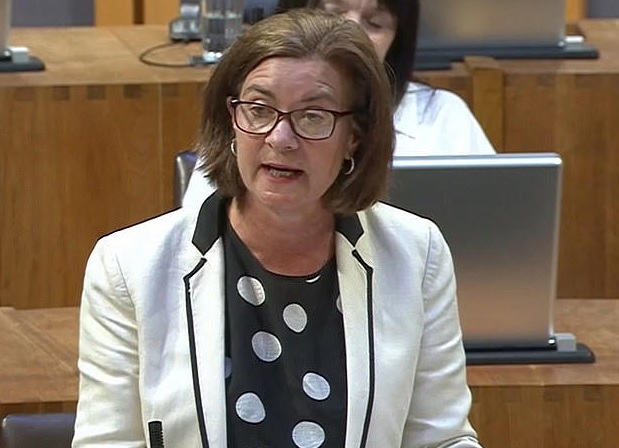
First Minister, MP, MS and teaching unions call for safety and support for staff
POLITICAL leaders and teaching unions across Wales have spoken out following Thursday’s assault on a teacher at Milford Haven School, which led to a lockdown, a major police response and the arrest of a 15-year-old boy on suspicion of attempted murder.
The First Minister Eluned Morgan said she was “deeply concerned” by the incident and stressed that violence had no place in Welsh schools.
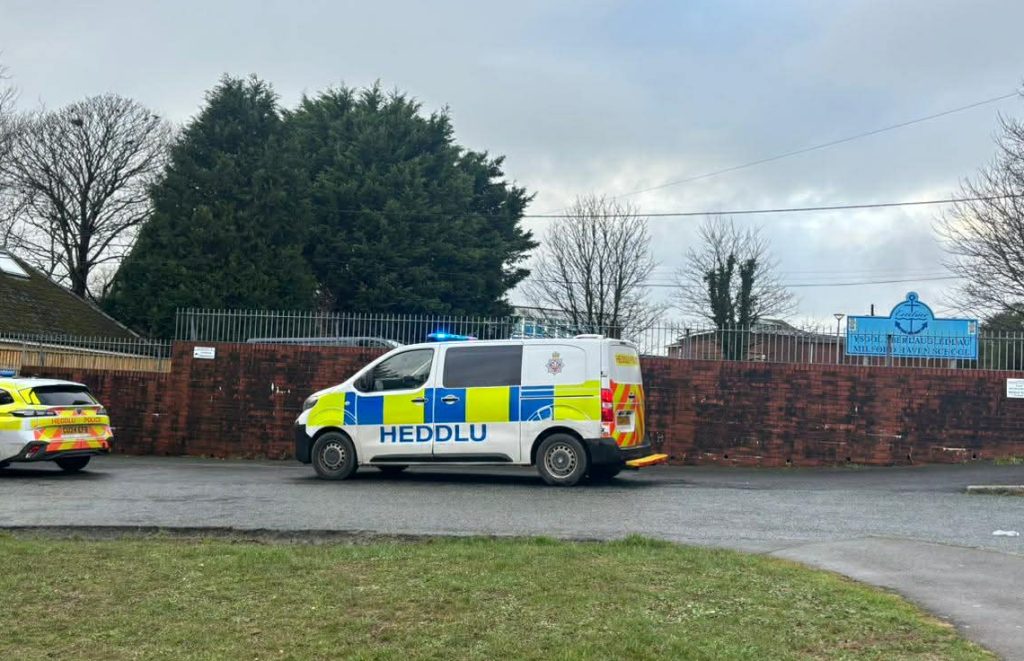
Her comments come just days after she visited the Milford Haven campus following the school being placed into special measures by Estyn, where she met leaders to discuss improvement plans and support arrangements.
She said her thoughts were with the injured teacher, their family and the wider school community, and praised the swift response of staff and emergency services.
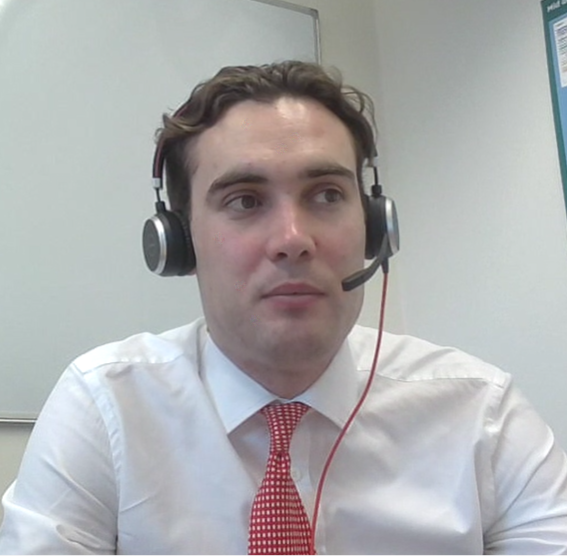
Local MP Henry Tufnell, who represents Carmarthen West and South Pembrokeshire, described the incident as deeply upsetting for what he called a close-knit community.
He said he was thinking of the teacher and pupils affected and thanked Dyfed-Powys Police and ambulance crews for their professionalism.
Meanwhile Senedd Member Samuel Kurtz said: “Deeply concerning news across the water in Milford Haven.
“Sadly, violence in our schools is becoming all too common, and thanks must go to the emergency services for their timely response. Thoughts are with the injured teacher, their family and the wider school community.”
Leader of the Welsh Conservatives Andrew RT Davies said teachers must feel safe at work and called for continued support for school staff.
Teaching unions also responded.
NASUWT said teachers “deserve to feel safe in their workplace” and that any violence against staff must be taken seriously, while National Education Union said schools must remain safe spaces for both pupils and staff and urged continued focus on safeguarding and behaviour support.
All said support would be offered to the Milford Haven school community in the days ahead as police investigations continue.
Crime
Teacher discharged as police step back from Milford Haven school after assault
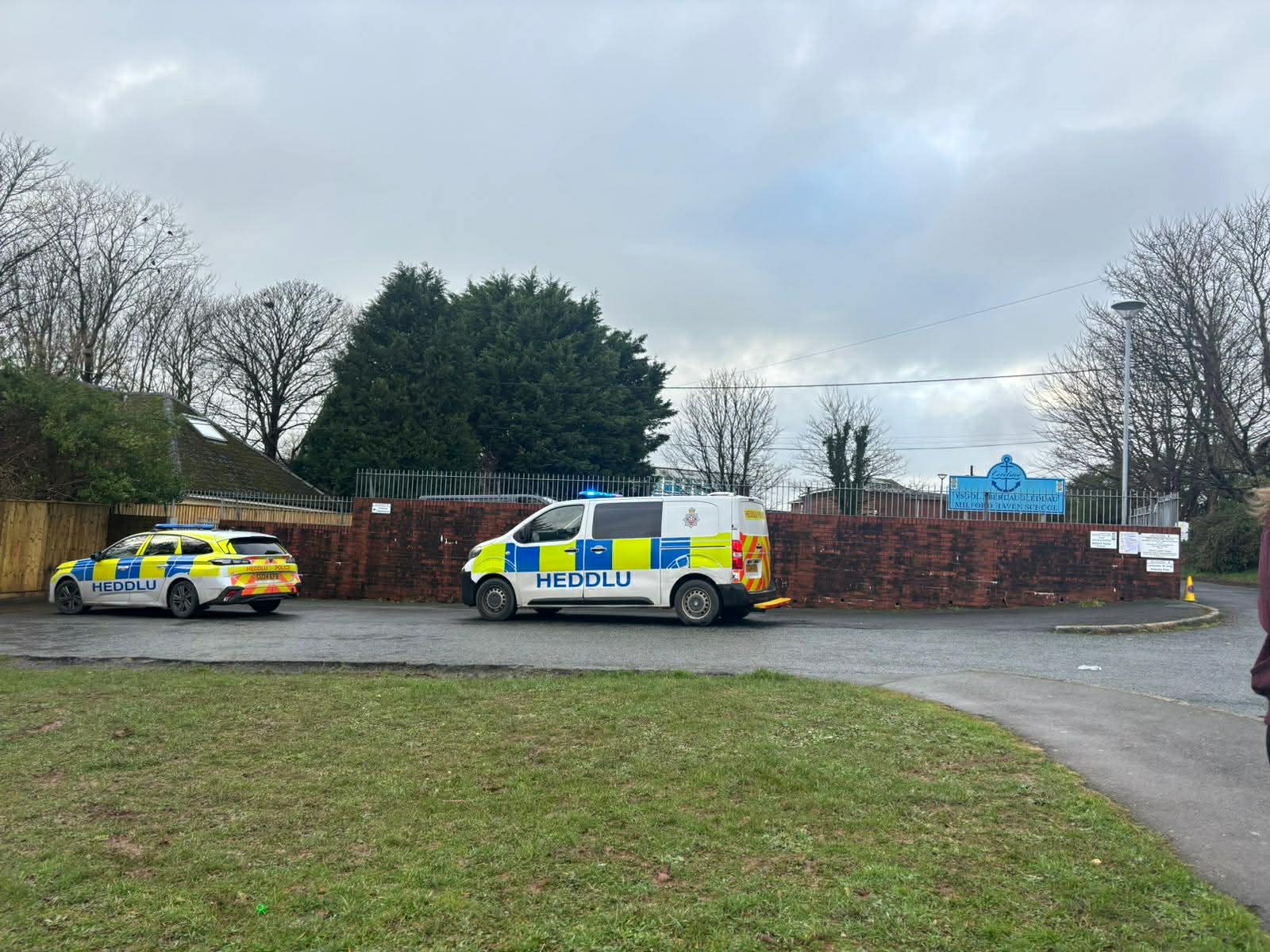
Teenager remains in custody as school closes and patrols increased to reassure community
POLICE have confirmed they are no longer stationed at Milford Haven School after a teacher was assaulted by a pupil on Thursday afternoon (Feb 5), as the injured member of staff has now been discharged from hospital.
In a joint statement issued by Dyfed-Powys Police, Pembrokeshire County Council and Hywel Dda University Health Board, Superintendent Chris Neve said swift action had been taken to protect pupils and staff.
He said: “Police are no longer in attendance at Milford Haven Comprehensive School, following a report of the assault of a teacher at approx. 3.20pm this afternoon.
“I would like to reassure parents, and the wider community, that swift action was taken to both safeguard pupils and teachers, and to trace the suspect as soon as this report was received.
“The teacher has now been discharged from hospital and is being supported by specialist officers. All pupils at the location were safe, and all returned home unharmed. A 15-year-old boy has been arrested and remains in police custody as enquiries continue.
“You will see a higher than usual police presence in the area over the coming days – these will be dedicated patrols to provide further reassurance.”
The injured teacher was earlier taken to hospital by road ambulance.
An immediate lockdown was put in place at the school while emergency services responded. Most pupils had already left for the day, but those still on site were secured inside classrooms and offices as a precaution.
School closed on Friday
Council leader Cllr Jon Harvey said the school would be closed to pupils on Friday to allow support and safety measures to continue.
He said: “We would like to thank staff and pupils at Milford Haven School for implementing a swift and effective lockdown in response to this incident.
“While the school will be closed to pupils tomorrow, if there are any learners who require additional support they are welcome to attend and there will also be support for staff on site.
“We’d like to reassure learners and parents, along with the wider community, that all measures to ensure safety are being taken.”
The health board added that anyone needing urgent mental health support can call NHS 111 and press option 2 for 24-hour assistance.
National spotlight
The incident has drawn national media attention.
BBC News broadcast live from the school gates during its Ten O’Clock News bulletin, while ITV News and several national titles also covered developments.
Journalists from a number of UK outlets, including The Sun, contacted The Herald as events unfolded, with several Welsh and national publishers using photographs first taken by Herald reporters.
Residents said the scale of coverage was unprecedented for the normally quiet port town.
Police enquiries are continuing.
Photo caption:
Police outside Milford Haven School following Thursday’s incident (Pics: Herald).
Health
Health board targets rise in steroid and gym drug use across west Wales

THE LOCAL health board has launched new targeted measures after recording a sharp rise in the use of steroids and other image-enhancing drugs across the region.
Hywel Dda University Health Board says needle exchange figures show significant growth over the past two years in people seeking support related to Image and Performance Enhancing Drugs (IPEDs), including anabolic steroids and so-called Selective Androgen Receptor Modulators (SARMs).
SARMs, while marketed online as safer alternatives to steroids, are illegal to sell in the UK and health professionals warn they carry serious and largely unknown risks.
The health board has now teamed up with Dyfed Drug and Alcohol Service (DDAS) and Choices, a young people’s substance use service, to tackle what officials describe as an “emerging public health challenge”.
Workshops and outreach
Two key initiatives have been introduced.
Educational workshops are being delivered to young people, focusing on the risks of using performance-enhancing substances during physical development and the potential long-term effects on hormones, mental health and fertility.
At the same time, enhanced support is being offered to people already involved in gym and fitness culture, with harm-reduction advice, health monitoring and confidential drop-in services.
Support includes testosterone testing, blood checks, cycle provision kits and discreet one-to-one consultations.
One service user described the programme as “quick, professional and non-judgemental”.
They said: “The drop-in clinic for my blood test was really convenient. I was seen quickly and given a full run-down of the services available. The staff made me feel comfortable the whole time and I got my results back faster than expected.”
Taking support into the community
The team has also worked directly with local gyms, leisure centres and sports venues, speaking to more than 100 people during five outreach sessions.
Twelve DDAS staff members have completed specialist IPED training delivered by Public Health Wales to strengthen expertise within the service.
Rachel Wilson, Resilient Families Manager at Choices, said the aim is to reduce stigma.
She said: “We’re proud to work alongside Hywel Dda to ensure people who use IPEDs are met with understanding, not judgement. These initiatives are helping us reach individuals who may not have previously considered accessing support.”
Craig Jones, Prevention and Population Health Improvement Manager, added: “This work is about meeting people where they are. By listening and responding with compassion and evidence-based care, we’re making a real difference.”
Dr Ardiana Gjini, Executive Director of Public Health, said the approach showed the board’s commitment to early intervention.
She said: “These initiatives reflect a proactive, collaborative response to emerging health challenges and demonstrate our dedication to protecting the health of our communities.”
Anyone seeking confidential advice or support can contact DDAS on 03303 639997 to book an appointment.
-

 Crime2 days ago
Crime2 days agoSex offender jailed after living off grid in Pembrokeshire and refusing to register
-

 Health14 hours ago
Health14 hours agoHealth board targets rise in steroid and gym drug use across west Wales
-

 News3 days ago
News3 days agoPrincess of Wales visits historic Pembrokeshire woollen mill
-

 Crime7 days ago
Crime7 days agoPembroke man accused of child sex offences sent to Swansea Crown Court
-

 Health4 days ago
Health4 days agoDoctor struck off after sexual misconduct findings at Withybush Hospital
-

 Crime16 hours ago
Crime16 hours agoTeacher injured and teenager arrested for attempted murder at Milford Haven School
-

 Community7 days ago
Community7 days ago50s women threaten legal action over pension compensation refusal
-

 Crime3 days ago
Crime3 days agoHakin man’s appeal delayed again as Crown Court seeks guidance on insurance law

























